-
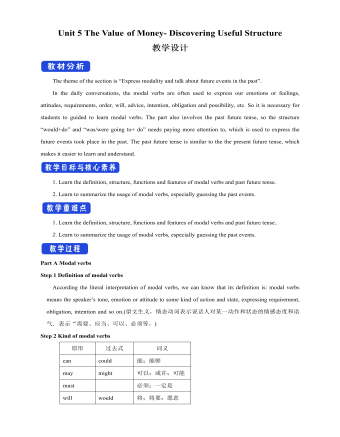
新人教版高中英语必修3Unit 5 The Value of Money- Discovering Useful Structure教学设计
Step 3 Meaning1. 过去将来时表示从过去某一时间来看将要发生的动作或存在的状态, 常用在宾语从句中。一般由“would/should +动词原形”构成。She hoped that they would meet again someday. 她希望将来有一天他们能再见面。2. was/were going to+动词原形: 表示过去将要发生或很有可能发生的动作, 常用于口语中, 表示预言、意图或者打算等。He was going to start work the following week. 他打算下星期开始工作。3. was/were about to do: 常用来表示即将发生的动作, “刚要/正要做……”。注意该结构不与任何时间状语连用。I felt that something terrible was about to happen. 我感到某种可怕的事情即将发生。4.was/were to do: 表示“曾计划做某事”, 如果表示“本来计划做某事, 动作没实现”, 则需用 “was/were to have done”。She said she was to have told me about the accident. 她说她本来想告诉我关于事故的事。5.Start, go, come, leave, see, meet等动词的过去进行时: 表示就过去某一时刻而言即将发生的动作。She was coming later. 她随后就来。I had just put on my overcoat and was leaving to visit a friend of mine. 我刚穿上外套要去看我的一个朋友。
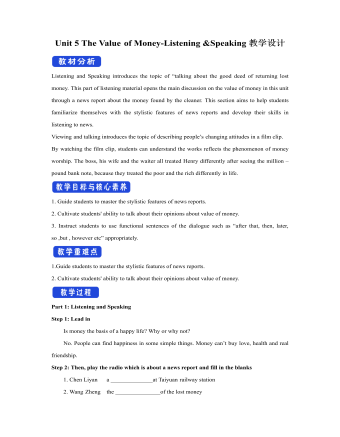
新人教版高中英语必修3Unit 5 The Value of Money-Listening &Speaking教学设计
Step 4: Listen again and decide if the following statements are true (T) or false (F).1 It was the first time Chen Liyan's story was reported. T口 F口2 Chen found 10,000 yuan in a small plastic bag in Taiyuan railway station口 F口3 Wang Zheng apologized to Chen because he couldn't offer her more money. T口 F口4 Chen took out a large loan to cure her daughter, T口 F口5 Wang set up a fundraising website for Chen's daughter after Chen told him about her situation. T口 F口Step 5:After listening, discuss the questions.1 What kind of person do you think Chen Liyan is?Chen Liyan is generous and honest because she returned a large sum of money to the owner.2 Did Chen return the money because she didn't need it?No. She returned the money because it was the right thing to do. Evidence for this is that she refused to accept the reward money because she felt that it had not been earned. 3 Is it common for people to do what Chen did?It depends on the culture. In some countries it is quite common to return money that has been found. In other countries, people believe "Finders are keepers!" 4 How did Wang Zheng feel about the return of his money?He must have been very happy and relieved to have gotten his money back. We know this because he thanked Chen repeatedly and even offered her a reward.5 Why did Ma Dongbao tell Wang about Chen's family?He must have had great sympathy for Chen and her daughter and wanted to help them.'We know this because he arranged help for them. 6 How did the news reporter feel about Chen's actions?The news reporter felt that it showed that money wasn't the most important thing in life. We know this because the reporter told us that this is what Chen believes. and then said, “that's a great attitude to take."
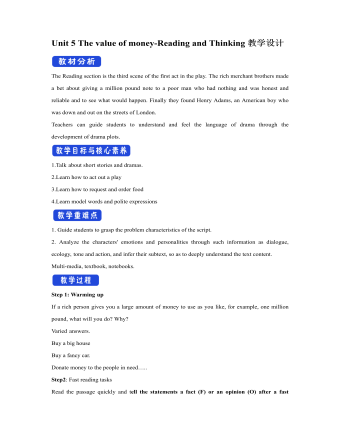
新人教版高中英语必修3Unit 5 The value of money-Reading and Thinking教学设计二
? Could you offer me some kind of work here?? I don’t want your charity, I just want an honest job.? Careless: I landed in Britain by accident.Step 7:Consolidation.? Find Henry? Roderick and Oliver were I .making a bet when they saw Henry, a poor young man. ? Know Henry? About a month ago, Henry was sailing and later he found himself carried out to sea by a strong wind. Fortunately, he 2.was spotted by a ship. And it was the ship that brought him to 3.England? Offer money to Henry ? Oliver and Roderick gave Henry a letter and told him that there was money in it. They 4.persuaded him to accept it, and made him 5.promise that it wouldn't be opened until 2 o'clock.Step 8:Language pointsa large amount of: a large quantity of; a great deal ofe.g. They bought a large amount of furniture before they moved their new house.make a bet: make an arrangement to risk money, etc. on an event of which the result is doubtful.e.g. We made a bet on the result of the match.permit sb to do something: allow somebody to do somethinge.g. My mother doesn’t permit me to ride in the street after it rained.by accident: as a result of chancee.g. I only found it by accident.stare at: look at somebody or something with the eyes wide open in a fixed gaze( in astonishment, wonder, fear, etc)to be honest: to tell you the truth; to be franke.g. To be honest, I don’t think we have a chance of winning.Step7 Homework:What do you think will happen to Henry? Will the bank-note help him or get him into trouble?
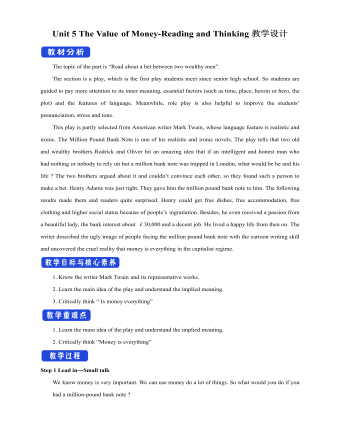
新人教版高中英语必修3Unit 5 The Value of Money-Reading and Thinking教学设计一
Everybody wants to get wealth.In today’s material world,making money or becoming wealthy symbolizes a person’s success and capability. Many people just make every effort, pay any price to attain greater wealth. With money,they can buy nice, large apartments in nice neighborhood. With money they can own luxurious cars. Wealth seems to bring all happiness in life.But is wealth the only road to happiness? Not really. There are many things in the world, which are beyond the means of money, such as friendship, love, health and knowledge. People are so preoccupied with struggling for money that they have no time or would not take the time to form or maintain friendship. What happiness can they feel living as lonely miserable creatures without love or friends in the world even if they accumulate tremendous wealth?In my opinion, people can’t do anything without money, but money is not everything. What money will bring you depends on your personal belief and goal in life. If you are kind enough to help others, especially the poor, money is a good thing to you. With it, you can do much more for the benefit of people and your country, and it will add to your own happiness. If you want money just for your own needs, you’ll never be satisfied or happy. In a word,you should have money spent for more people. Only then can money be the source of your happiness.Step 8 Homework4 students in a group, one acts Roderick, one Oliver, one servant and the fourth one acts Henry Adams, then listen to the tape, pay more attention to the difference between American English and British English in pronunciation, stress, tone.
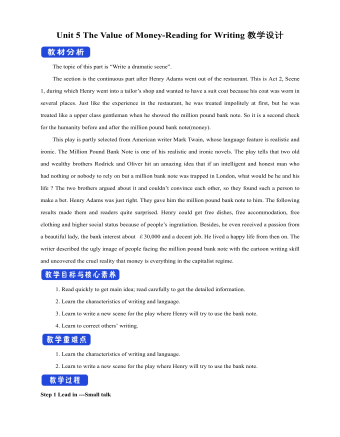
新人教版高中英语必修3Unit 5 The Value of Money-Reading for Writing教学设计二
2. 您能看到, 我头发太长了。You can see that my hair is much too long.3. 无论什么时候, 只要您想回来就回来。Please come back whenever you want.4. 您仅有很少的头发要理! You only have too little hair to cut !5. 为您服务是我的荣幸!It is my honour to serve you!Step 9 Writing(Henry is walking down the street when he sees a sign for a place that cuts hair. He decides to have it cut. )H=Henry B=BarberH: Good afternoon, I’d like to have my hair cut, if I may. (The barber looks at Henry’s hair and continues cutting another man’s hair. ) Er, I’d really like a haircut. As you can see it’s much too long. B: (in a rude manner) Yes, I can see that. Indeed, I can. H: Fine, well, I’ll have a seat then. (He sits in one of the barber’s chairs. The barber turns to look at Henry. )B: It’s quite expensive here, you know! Are you sure you can afford it?H: Yes. I think so. (After his hair is cut, the barber tells Henry how much he must pay. Henry shows the barber the bank note. )B: Why Mr. . . (looks shocked)H: Adams. Henry Adams. I’m sorry. I don’t have any change. B: Please don’t worry! (wearing a big smile) Nothing to worry about! Nothing at all! Please come back whenever you want, even if you only have too little hair to cut! It will be my honour to serve you!Step 10 Pair workExchange drafts with a partner. Use this checklist to help your partner revise his/her draft.1. Are all the elements of a play included and in good order ?2. Do the character use suitable language ?3. Are the stage directions clear and useful ?4. Is the plot clear and exciting enough ?
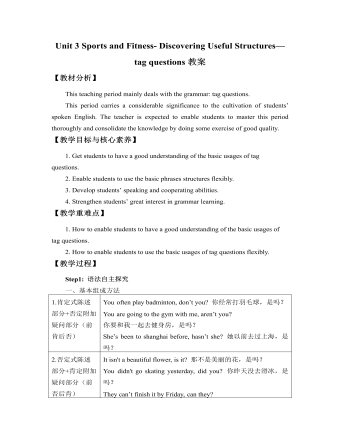
新人教版高中英语必修1Unit 3 Sports and Fitness- Discovering Useful Structures—tag questions教案
【教材分析】This teaching period mainly deals with the grammar: tag questions.This period carries a considerable significance to the cultivation of students’ spoken English. The teacher is expected to enable students to master this period thoroughly and consolidate the knowledge by doing some exercise of good quality.【教学目标与核心素养】1. Get students to have a good understanding of the basic usages of tag questions.2. Enable students to use the basic phrases structures flexibly.3. Develop students’ speaking and cooperating abilities.4. Strengthen students’ great interest in grammar learning.【教学重难点】1. How to enable students to have a good understanding of the basic usages of tag questions.2. How to enable students to use the basic usages of tag questions flexibly.【教学过程】Step1: 语法自主探究一、基本组成方法1.肯定式陈述部分+否定附加疑问部分(前肯后否) You often play badminton, don’t you? 你经常打羽毛球,是吗?You are going to the gym with me, aren’t you?你要和我一起去健身房,是吗?She’s been to shanghai before, hasn’t she? 她以前去过上海,是吗?2.否定式陈述部分+肯定附加疑问部分(前否后肯) It isn't a beautiful flower, is it? 那不是美丽的花,是吗?You didn't go skating yesterday, did you? 你昨天没去滑冰,是吗?They can’t finish it by Friday, can they?他们不能在星期五之前完成,是吗?
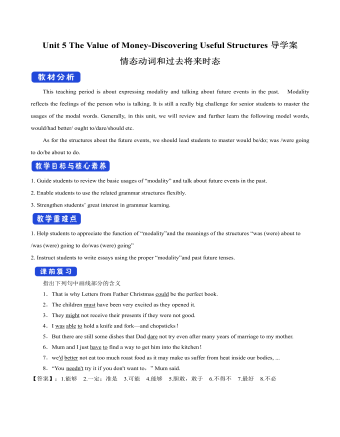
新人教版高中英语必修3Unit 5 The Value of Money-Discovering Useful Structures导学案
4.They were going to find someone to take part in their bet when they saw Henry walking on the street outside.[归纳]1.过去将来时的基本构成和用法过去将来时由“would+动词原形”构成,主要表示从过去某一时间来看将要发生的动作(尤其用于宾语从句中),还可以表示过去的动作习惯或倾向。Jeff knew he would be tired the next day.He promised that he would not open the letter until 2 o'clock.She said that she wouldn't do that again.2.表示过去将来时的其他表达法(1)was/were going to+动词原形:该结构有两个主要用法,一是表示过去的打算,二是表示在过去看来有迹象表明将要发生某事。I thought it was going to rain.(2)was/were to+动词原形:主要表示过去按计划或安排要做的事情。She said she was to get married next month.(3)was/were about to+动词原形:表示在过去看来即将要发生的动作,由于本身已含有“即将”的意味,所以不再与表示具体的将来时间状语连用。I was about to go to bed when the phone rang.(4)was/were+现在分词:表示在过去看来即将发生的动作,通常可用于该结构中的动词是come,go,leave,arrive,begin,start,stop,close,open,die,join,borrow,buy等瞬间动词。Jack said he was leaving tomorrow.
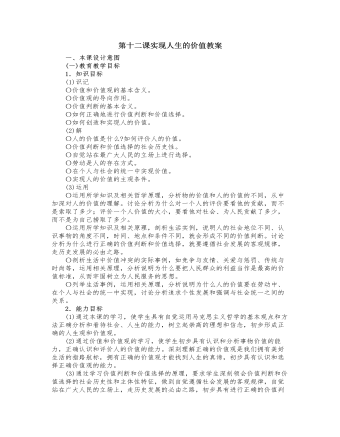
人教版高中政治必修4第十二课实现人生的价值教案
有的学者还指出,要坚持集体主义还必须将集体主义的价值精神与社会主义市场经济的要求结合起来,批判地继承计划经济时代倡导的集体主义,合理地对其进行体系结构的调整和内容的更新,形成新的集体主义。与传统的集体主义相比,这种新的集体主义应具有如下两个主要特点。其一,强调集体的出发点是为了维护集体成员的正当个人利益。传统的集体主义具有片面强调集体至上性、绝对性的弊端;新的集体主义必须依据社会主义市场经济的现实要求,将集体应当对个人承担的义务加以科学的阐释。真正的集体应该维护各个集体成员的个人利益,实现组成集体的各个主体的自我价值。这种新型的集体主义是对社会主义市场经济条件下社会关系的真实反映,既与个人主义有本质区别,也不同于传统的集体主义。其二,要体现道德要求的先进性与广泛性的统一。
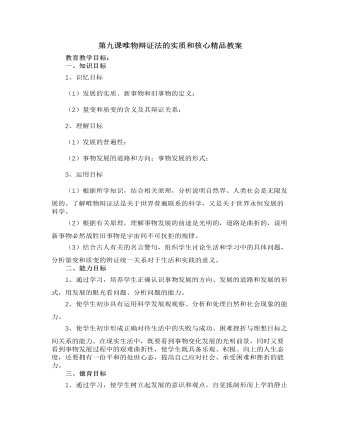
人教版高中政治必修4第九课唯物辩证法的实质和核心精品教案
a矛盾的同一性是矛盾双方相互吸引、相互联结的属性和趋势。它有两方面的含义:一是矛盾双方相互依赖,一方的存在以另一方的存在为前提,双方共处于一个统一体中;同一事物都有对立面和统一面两个方面,一方的存在以另一方为条件,彼此谁都离不开谁(形影想随、一个巴掌拍不响、不是冤家不聚头)。【举例】P67漫画:他敢剪吗?悬挂在山崖上的两个人构成一种动态的平衡。【举例】磁铁(S极和N极);没有上就没有下、没有香就没有臭、没有福就无所谓祸;【举例】父子关系(父亲之所以是父亲,因为有儿子,儿子之所以是儿子,因为有父亲);师生关系;二是矛盾双方相互贯通,即相互渗透、相互包含,在一定条件下可以相互转化。 【相关衔接】P68生物变性现象,雌雄转化现象【举例】生产与消费具有直接统一性
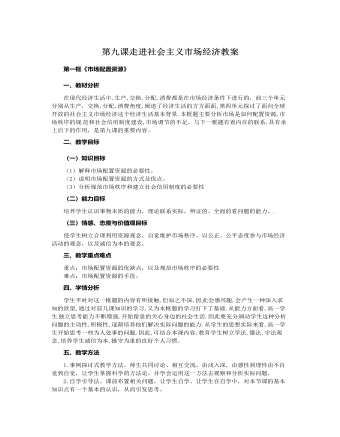
人教版高中政治必修1第九课走进社会主义市场经济教案
法律手段:制定和运用经济法规,包括经济立法、经济司法活动等行政手段:采取强制性的行政命令、指示、规定等运用举例:我国一些地区遭遇突如其来的“禽流感”,禽类养殖户损失惨重。国家采取了对疫区封锁,对疫区的养殖户进行经济补贴,以及国家出资统一对疫区进行消毒等措施进行防治,并规定任何人不得将家禽带出疫区,违者追究法律责任。请结合材料说明在防治“禽流感”、发展禽类养殖的过程中,我国政府分别采取了哪些措施教师分析:对疫区养殖户进行经济补贴体现经济手段;对违反规定者追究法律责任,体现法律手段;对疫区进行封锁体现行政手段。(四)反思总结,当堂检测。教师组织学生反思本节课的主要内容(参照板书),进行总结。设计意图:对本节课的内容进行小结,学生的概括过程也是检验学生对本节课理解程度的过程。再次明确学生是学习的主体,并能够发现,问题解决问题。
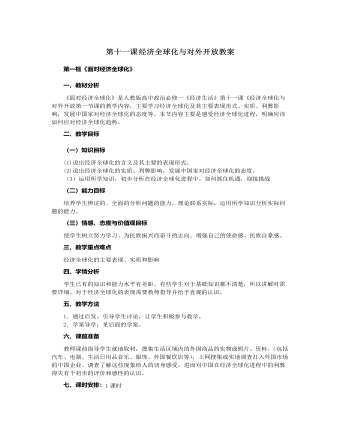
人教版高中政治必修1第十一课 经济全球化与对外开放教案
材料说明了什么?探究二:材料分析:2005年12月13日至18日,WTO第六次部长级会议在香港召开。会议经过谈判通过了《部长宣言》,规定发达成员和部分发展中成员2008年前向最不发达国家所有产品提供免关税、免配额的市场准入;发达成员2006年取消棉花的出口补贴, 2013年年底前取消所有形式农产品出口补贴。材料体现了世界贸易组织在国际经济贸易领域中发挥哪些作用?探究三:P97:A、这些图示,反映出我国利用外资哪些特点?。B、能为我国提高外资利用水平提出些建议吗?探究四:材料展示:我国是人口众多的发展中大国,全国居民每天消费总额达到37亿元。每天消费粮食75万吨,相当于一个县级商品粮基地的全年产量;每天消耗猪肉6万吨,食油1万吨,糖1.6万吨,鲜蛋1.8万吨。每天购买杂志600多万册,报纸5000多万份,需要400量中型载货汽车才能装载。
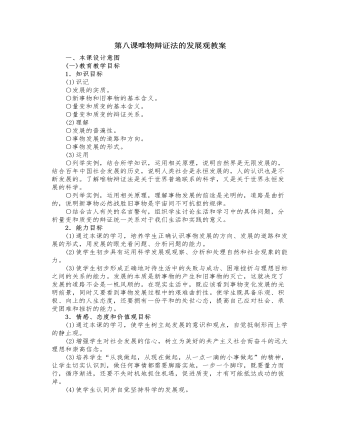
人教版高中政治必修4第八课唯物辩证法的发展观教案
1973年4月的一天,一名男子站在纽约的街头,掏出一个约有两块砖头大的无线电话,并开始通话。这个人就是手机的发明者马丁,当时他是摩托罗拉公司的工程技术人员。这是当时世界上第一部移动电话。1985年,第一台现代意义上的可以商用的移动电话诞生。它是将电源和天线放置在一个盒子里,重量达3公斤。与现代形状接近的手机诞生于1987年,其重量大约750克,与今天仅重60克的手机相比,像一块大砖头。此后,手机的“瘦身”越来越迅速。1991年,手机重量为250克左右。1996年秋,r出现了体积为100立方厘米、重量100克的手机。此后,又进一步小型化,轻型化,到1999年就轻到了60克以下。手机的体积越来越小,但功能却越来越多。以前的手机是用来通话的,现在的手机是用来享受的。今天,手机可以是相机、游戏机、音乐播放器、信用卡、电影院……手机带来的不仅仅是通信方式的改变,更是生活方式的变革。
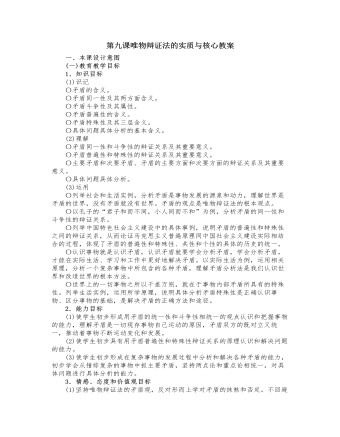
人教版高中政治必修4第九课唯物辩证法的实质与核心教案
探究活动8(教材第72页):“结合生活事例,谈谈你在面对复杂事物时是如何分析和解决矛盾的?”这一探究活动是在学生还不了解主次矛盾的原理时,让他们回忆自己在生活中有没有遇到过面对许多矛盾时是如何解决的经历。比如,每天面对很多作业,先做哪门课作业后做哪门作业,你是如何考虑的?在学校面对学习、体育运动和社会工作,你是怎么安排的?在生活中,你遇到这样的情况都是怎样解决的?通过探究活动,使学生弄清主次矛盾的原理,学会用矛盾分析法分析问题。探究活动9(教材第73页):“你在生活中是如何分析具体问题的?”这一探究活动,强调的是“你”在生活中是如何运用分析法分析具体问题的,要紧紧围绕学生这一中心,首先强调具体问题具体分析的方法非常重要,这是马克思主义的一个原则,是马克思主义的活的灵魂。引导学生主动运用这种分析方法分析看待自己,分析看待社会。可以组织学生进行讨论、交流,还可以让学生撰写小论文,写出自己运用这种分析方法分析了哪些具体问题,有哪些感受。
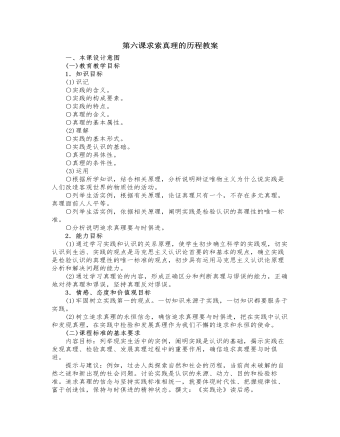
人教版高中政治必修4第六课求索真理的历程教案
农业科学的周期是以年为时间单位,一次实验就要等到一次花开、结果。就这样,几个实验误导了袁隆平好几年。这时登在《参考消息》上的一篇不起眼的文章像给迷途中的袁隆平以当头一棒:克里克、沃森和威尔金斯发现DNA螺旋结构,西方的遗传学研究进入分子水平。“我当时还在那里搞什么无性杂交,糟糕得很”。水稻是自花授粉植物,雄蕊雌蕊都在一朵花里面,雌雄同株,没有杂种优势一杂种优势是生物界的普遍现象,小到细菌,大到人,近亲繁殖的结果是种群的退化。但是水稻因为花小,其杂交是当时公认的世界难题,设在马尼拉的世界水稻研究中心就是因为困难重重,差点关闭。袁隆平偏不信这个邪,他突发灵感:专门培养一种特殊的水稻品种——雄花退化的雄性不育系,没有自己的花粉,这样不就可以做到杂种优势了吗?于是,漫长的寻找过程开始了,要找到这样一株雄花退化而且杂交之后产量猛增的“太监”水稻简直是大海捞针。
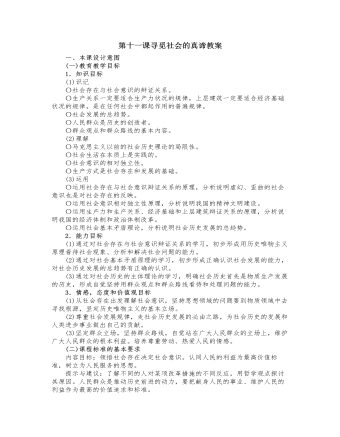
人教版高中政治必修4第十一课寻觅社会的真谛教案
思考提示在阶级社会中,社会基本矛盾的解决主要是通过阶级斗争实现的,阶级斗争是推动阶级社会发展的直接动力,当旧的生产关系严重阻碍生产力发展,需要进行变革时,代表旧的生产关系的没落阶级却不会自动退出历史舞台,利用旧的上层建筑维护自己的统治,只有代表新生产力发展方向的阶级通过社会革命,推翻没落的阶级统治,才能解放生产力,推动社会向前发展。所以,阶级社会的进步往往是通过激烈的社会革命实现的。但是,社会主义社会与阶级社会不同,这是因为,社会主义社会中,生产力和生产关系、经济基础和上层建筑之间的矛盾是一种非对抗性矛盾,不需要通过一个阶级推翻另一个阶级的阶级斗争的方式来解决,只能通过改革实现社会的发展,通过对生产关系和上层建筑进行改革,实现社会主义的自我完善,从而促进社会的发展。所以,我国经济体制改革是在坚持社会主义制度的前提下,改革生产关系和上层建筑中不适应生产力发展的一系列相互联系的环节和方面。
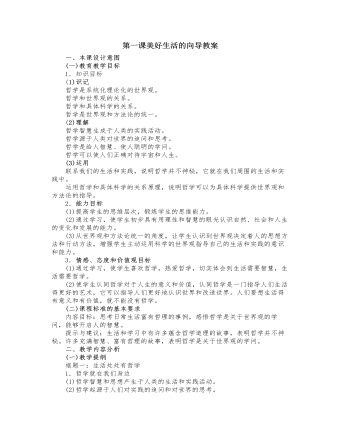
人教版高中政治必修4第一课美好生活的向导教案
3.柏拉图(公元前427一前347)古希腊哲学家。生于雅典。苏格拉底的弟子,亚里士多德的老师。他曾在雅典创办学园,收徒讲学,逐步建立起欧洲哲学史上第一个客观唯心主义体系。他也是欧洲哲学史上第一个有大量著作传世的哲学家。他提出世界的本源是“理念”,现实中的事物都是“理念”的摹本。人的知识来源于对“理念”的回忆。柏拉图的哲学思想对后世影响很大,有人说,柏拉图之后的欧洲哲学思想都是对柏拉图思想的注脚。4.黑格尔(1770—1t53l)19世纪德国古典哲学家,客观唯心主义者、辩证法大师。生于斯图加特,卒于柏林。出身于官僚家庭。曾在图宾根神学院学习哲学和神学。大学毕业后,做过几年家庭教师。后任报纸编辑、中学校长、大学讲师、教授和柏林大学校长。黑格尔是在法国革命的直接影响下成长起来的,青年时朝气蓬勃,非常激进。他还深受著名诗人歌德的影响。1818年,他到柏林大学任教后,公开美化普鲁士专制制度,号召人们同现实妥协。
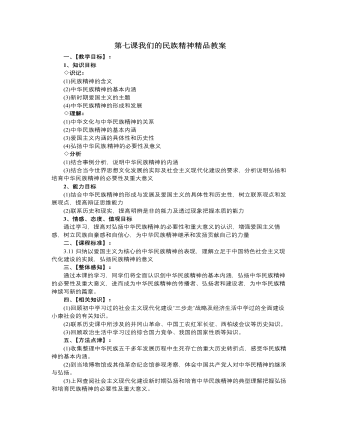
人教版高中政治必修3第七课我们的民族精神精品教案
4.弘扬和培育中华民族精神,是坚持社会主义道路的需要在这里重点把握坚持社会主义道路为什么必须弘扬和培育民族精神这一知识点。由于中国走的是社会主义道路,而西方敌对势力不愿意看到社会主义中国发展壮大,加紧以各种手段和方式对我国实施西化、分化的政治战略。面对这种挑战,要顶住霸权主义的种种压力,抵制外来腐朽思想文化的影响,弘扬和培育民族精神显得更为重要和迫切。◇拓展延伸:当今世界,不同社会制度意识形态之间的斗争在一定范围内将长期存在,斗争的一种重要表现就是西方敌对势力对社会主义的中国实施西化、分化的政治战略。因此,必须通过弘扬和培育民族精神来坚定人们的社会主义信念,抵制外来腐朽思想文化的侵蚀。◇课堂练习:面对西方敌对势力对我国实施的西化、分化,我们必须()①大力弘扬和培育民族精神②加快社会主义现代化建设步伐,坚定人们的社会主义信念③借鉴西方文化中的先进成分④加强社会主义道德建设,提高抗侵蚀能力A.①②③B.②③④C.①②④D.①②③④
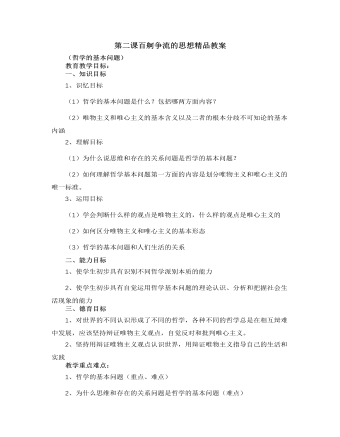
人教版高中政治必修4第二课百舸争流的思想精品教案
7、人总是按照自己对周围世界和人生的理解做事。有人认为命由天定,因而身处困境只是消极等待、逆来顺受;有人认为人定胜天,因而在困难面前积极奋争、不屈不挠。以上材料说明( )A哲学源于人们对实践的追问和对世界的思考B世界观决定方法论,方法论体现着世界观C哲学不等于自发的世界观D哲学是关于世界观的学说8、世界观和方法论的关系是()A世界观和方法论相互决定B方法论决定世界观,世界观体现方法论 C世界观决定方法论,方法论体现世界观 D世界观和方法论相互影响,相互决定9、下列关于哲学、世界观、具体知识之间联系的正确说法是()A哲学是关于世界观和具体知识的统一B哲学就是科学的世界观和具体知识C哲学是关于世界观的学说,是具体知识的概括和总结D哲学决定世界观,世界观决定具体知识10、下列对哲学的认识,不正确的是()A哲学是关于世界观的学说B哲学是世界观和方法论的统一C哲学是理论化、系统化、科学化的世界观D哲学是对具体知识的概括和总结
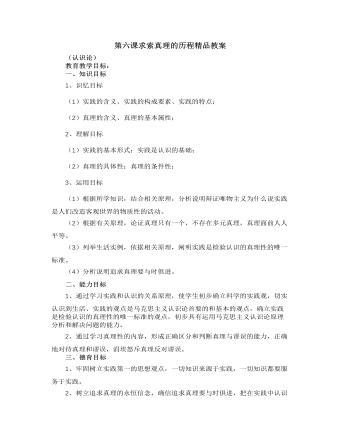
人教版高中政治必修4第六课求索真理的历程精品教案
二、分析题基于非典型肺炎防治的需要,武汉大学和中国科学院微生物研究所,集中优秀人才和先进的仪器设备,以科学的理论为指导,运用现代的知识与技术手段,对SARS病毒进行深入细致的研究。2003年5月,他们联合研制出抗击SARS病毒侵入细胞的多肽药物。经科学试验证明,它可以阻断SARS病毒侵入人体细胞,具有预防和治疗两种功效。这些药物的发明在非典型肺炎的预防和治疗发挥着重要的作用。上述材料体现了辩证唯物主义认识论的哪些观点?答案提示:体现了实践是认识的来源、实践是认识发展的动力、实践是检验认识的真理性的唯一标准、实践是认识的目的和归宿、认识对实践具有反作用等辩证唯物主义认识论的观点。三、辨析题1、“仁者见仁,智者见智”的说法否定了真理的客观性答案提示:(1)此观点错误。(2)“仁者见仁,智者见智”是说对同一事物不同的人有不同的见解。
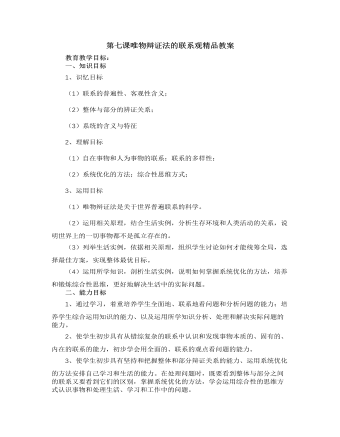
人教版高中政治必修4第七课唯物辩证法的联系观精品教案
二、分析题20世纪9 0年代以来,世界各国把发展循环经济、建立循环型社会看作是实施可持续发展战略的重要途径和实现方式。传统经济是一种“资源―产品―废弃物”单向流动的线形经济。循环经济倡导的是一种与环境和谐的经济发展模式,它要求把经济活动组织成一个“资源-产品-再生资源”的反复循环流程,做到生产和消费“污染排放量最小化、废物资源化和无害化”,以最小的成本获得最大的经济效益和生态效益。分析说明循环经济所倡导的经济发展模式是如何体现联系观点的。【答案提示】(1)联系具有普遍性和客观性。循环经济是资源、产品、再生资源相互联系的有机统一整体,它体现了联系的普遍性和客观性。(2)联系具有多样性。“资源-产品-再生资源”的反复循环体现了原因和结果在一定条件下可以相互转化;体现了三者之间的内部联系、外部联系等。(3)循环经济表明人们可以根据事物的固有联系,改变事物的状态,建立新的具体联系,以实现经济效益、生态效益和社会效益的统一。





















